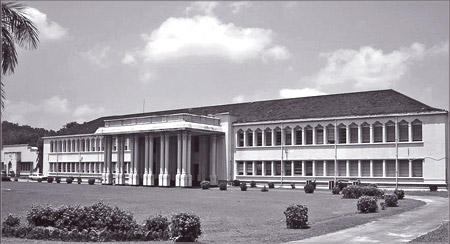|
The Concept of Business Village in Sri Lankan
Universities:
What is a ‘Business Village’?
A. L. M. A. Shameem Senior Lecturer South Eastern
University of Sri Lanka
What is Business Village?
|

Peradeniya University |
Business Villages are a way of providing accommodation for smaller
companies, by situating them under one roof. On the basis of sharing
resources such as office room, Information Technology, parking, and
reception staff, costs can be lower than for one company going it alone.
Economies of scale are tangible in these environments since the cost of
services is aggregated among all the businesses in the village.
Such villages provide complete business units, removing the problem
of finding, setting up and operating business office accommodation.
Office suits will be immediately available and ready to work at a
moment’s notice. This concept is very much important to Sri Lankan
Universities.
Often under the support of an academic institution, e.g. University,
such a site can incubate the growth of a start-up business until it
becomes a steady-going operation, and also provide an entrepreneurial
environment of like-minds. SMEs are in their nascent state in a Business
Village, and their potential for growth is nurtured here.
Interaction amongst businesses within a village can be mutually
supportive and may lead to collaborative projects. Business villages
provide their occupants with a competitive advantage.
Working conditions have a high level of standardization, e.g. similar
office ‘units’.
The facilities of a local University may be available for
utilization, as well as its labour pool of graduates and
under-graduates.
Working conditions are designed to be excellent, attractive to
businesses who would seek to situate themselves there.
As such, a business village can encourage the economic regeneration
of a locality by leveraging the lower costs of shared facilities and the
academic resources of a nearby academic institution. Business villages
are now common-place in Europe and America.
The synergy of business and academia manifested in this way is often
called a “Knowledge Hub”, essentially a region with an ensemble of
knowledge intensive organisations located in both the public and private
sectors. Such a hub serves the purpose of generating, applying and
transmitting knowledge.
|

Colombo University |
A knowledge hub hosts businesses to which there is competitive
advantage in being specialized knowledge orientated activities.
Furthermore, this can be allied to comparative advantage by virtue of
being located in a region to which is away from premium property prices,
high wages and cost of living. Thus Knowledge Hubs are particularly
attractive to hitherto underdeveloped regions.
The aim of this Business Villages in Universities:
The aim of this Business Villages in Universities is to:
Strengthen the university and local business through the
establishment of business village. It may involve enhancing the research
and development, facilitating the transfer of knowledge, ideas, and
technology to society and accelerates “time to innovation” in industries
and businesses, providing local entrepreneurs access to a vibrant,
friendly, and highly intellectual business place in order to achieve our
national goals.
Business Village (University) can encourage a wide variety of
businesses (Specially regional SMEs, Consultation and Training firms,
Publishing, and Tourism etc), driven by like-minded people, who develop
and work together. This will make local business more effective, and the
likelihood of success, greater.
Objectives of the Business Villages in Universities
Business Villages in Universities has two important objectives.
* One, to develop University-Industry-Business Partnerships at the
local and regional level in order to mutually benefit universities,
industries and businesses through R&D, innovation and initiative, and
development and transfer of knowledge, ideas, skills and technology to
Small and Medium Enterprises with a view to Enhancing Economic growth at
the local and regional levels; and
* Two, to spearhead a ‘Business Village Initiative’ in all National
Universities and with a specific purpose of creating a ‘Knowledge and
Innovation Initiative’ for Small and Medium Enterprises at the local and
regional levels towards achieving National Goals.
Expected Outcomes
Effective use of academic staff, graduates and undergraduates, and
research support mechanisms that promote collaboration will lead to the
creation and efficient use of knowledge to achieve national goals. The
outcomes from the proposed ‘Business Villages in Universities’ project
would be new research partnerships; new knowledge and ideas; new
products, processes, and industries and businesses (especially SMEs)
located in the country; economic growth; new jobs; and poverty
reduction. The outcomes from these efforts would be the creation of new
partnerships, new knowledge and ideas, achieving national goals in key
business policy areas, and the economic growth and jobs that result from
new activity.
Improvements in university management of intellectual property would
result in more effective dissemination of R&D results, generating
economic activities, particularly SMEs, and jobs in local and important
Small and Medium Enterprises.
What are the benefits?
Benefits can be mutual: University and Business unit.
(i) Benefits to the University
Some of the benefits are as follows:
* Good partnership can be established with Local Business community.
* Staff can enjoy with research and development contribution.
* Chance to develop intellectual, academic and economic capital
* Cross cultural business
* Increased employment scope at various level
* Can earn money : Such as rent
* Etc.
(ii) Benefits to the Business Units
Some of the benefits are as follows:
* Flexible terms and conditions
* Free parking facilities
* Access to business intellectual, consultation and training support
from experts (University Staff)
* Ready to use office setup.
* Meeting room usage
* IT support
* Telephone and internet connection (the only additional costs
payable are telephone line rental, call costs and any office
incidentals)
* Etc.
Actors and Actions
- National government: Continue to fund and expand research support
mechanisms that promote collaboration and innovation in universities.
- Within the context of making the R&D policies that incentivize
businesses to develop partnerships with universities for research that
results in new region-located economic activities.
- Businesses and universities: The relationship between business and
higher education should evolve into more of a peer-to-peer nature,
stressing collaboration in areas of joint interest rather than the
traditional customer-supplier relationship in which business procures
graduates and intellectual property from universities.
- Businesses and universities should work closely together to develop
new graduate degree programmes that address strategic workforce gaps for
science/social science/business management-based employers.
- National institutes, businesses, universities: Collaboration among
research by the nation’s national institutes, businesses, and
universities should be encouraged, since the latter’s capacity for small
and medium scale, sustained research projects both supports and depends
critically on both the participation of university faculty and graduate
students and the marketplace.
- Universities: Improve management of R&D, innovation and
intellectual property to improve and transfer knowledge, ideas, skills
and technology towards developing small and medium enterprises that
could support local and community economic development.
The above mentioned novel concept is timely needed in Sri Lankan
universities. At present, the structural changes in Sri Lankan higher
education policy do motivate the above concept to a certain extent in
some platforms. Therefore, the Sri Lankan universities should make a
greater thrust towards adopting this new concept in order to make our
universities in line with International standards.
[email protected]
|







